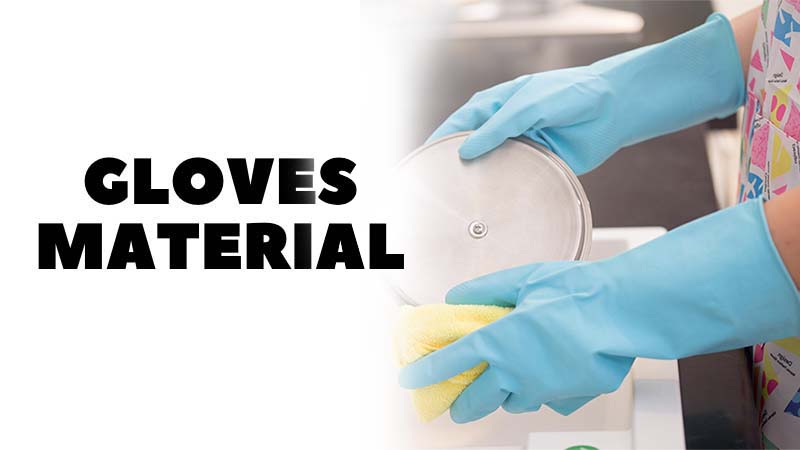
When dealing with chemicals, corrosive agents, and pointed objects, nothing serves better than gloves. There is not a single material that contributes to glove manufacturing. Each glove material suits a specific application.
Therefore, this guide helps you get familiar with every type of material, its pros/cons, and their usage. Let’s begin to uncover!
Gloves and Gloves Material
A glove refers to the hand covering you wear to protect against foreign materials/objects. It contains isolated parts for every finger as well as the thumb.
The glove material refers to a matter you can use to make your glove.
Types Of Gloves Material
There is not a single material that contributes to glove manufacturing. A plethora of materials exists. Wondering about what these materials are. Find out right below!
1. Latex
Latex refers to rubber, a milky white substance that other plants secret. Majorly the mature rubber tree bark is responsible for secreting Latex. The composition of Latex involves around 55 percent water and approximately 45 percent rubber.
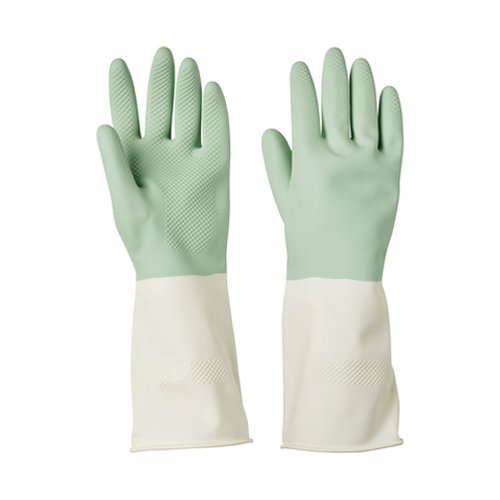 Latex Gloves
Latex Gloves
· Pros
- High level of tactility and dexterousness. Latex gloves feature a higher level of elasticity and ensure a tight fit.
- Excellent when it comes to the disposable class of gloves. Latex is biodegradable, which means it does not adversely impact the environment.
- Latex features higher tear resistance. You are going to enjoy a longer life with these gloves.
- Latex is a natural rubber that highly resists the impact of chemicals, including chlorine, basis, iodine, etc.
· Cons
- You can experience allergy on the skin when using these gloves
- Not good when dealing with the organic solvents
- It is challenging to locate the punctures in Latex gloves
· Usage
You can widely use Latex gloves in different fields, such as:
- Room cleaning
- Gardening, household activities
- The medical field, chemical, and food industries
- Beauty saloon
- Sanitary activities
2. Nitrile
Nitrile is a synthetic rubber resulting from the bonding between butadiene and acrylonitrile during polymerization.
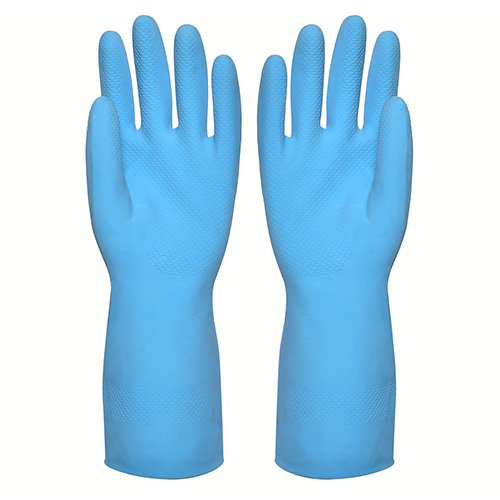
nitrile glove
· Pros
- Offers more excellent resistance (4x more) to puncture in comparison to Latex (natural rubber)
- You are going to enjoy more extended shelf life when using Nitrile gloves
- They are highly suitable for risky environments and harsh environments because they resist chemicals more effectively
- Offers unmatchable waterproof characteristics
- When using nitrile gloves, you don’t need to worry about skin allergies as well as reactions
· Cons
- You cannot use nitrile gloves when working with ketones, acids, and nitrogen compounds
- Not environmentally friendly and biodegradable
- Features higher cost than latex gloves
· Usage
Nitrile gloves are trendy among:
- Hairdressers
- Tattooists
- Mechanics
- Food Industry Worker
- Medical professionals
3. Coated Gloves
You can define coated glove as a cotton or fabric glove. Later this fabric is coated with any coating, including Latex, Nitrile, PVC, and polyurethane. Each coating imparts different end characteristics to the material.
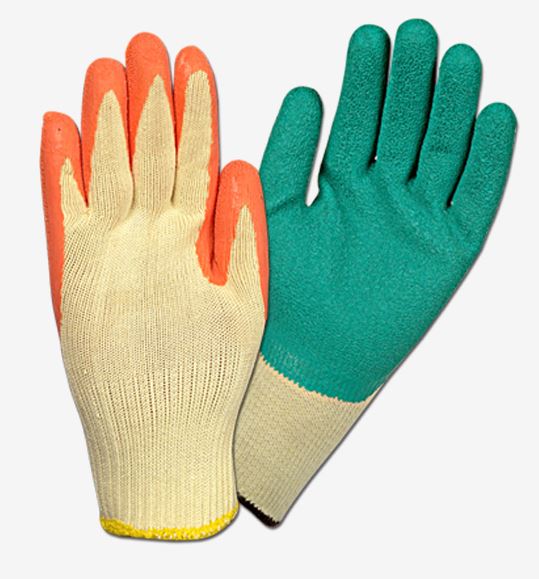
· Pros
- Ensure good resistance to cut or needle-like objects
- High toughness, which contributes to longer life
- High stretch ability
· Cons
- Skin sensitivity issues
- Increased penetration of coating material in knit lining of fabric
· Usage
- Manufacturing Industry
- Aerospace industry
- Precision assembling applications
4. Leather Gloves
Leather gloves are gloves that utilize leather as the primary manufacturing material. You can get leather possesses various advantages, making them suitable for multiple applications.
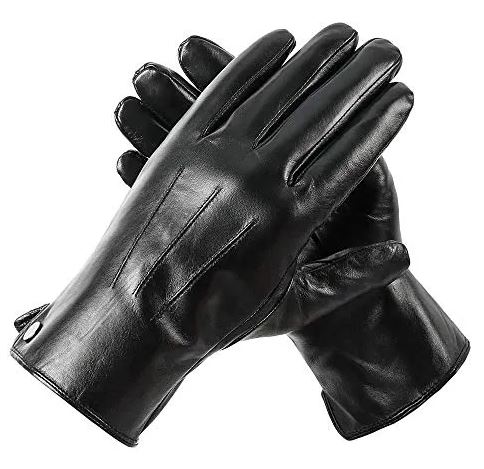
· Pros
- You can enjoy a higher level of comfort while wearing leather gloves
- Leather gloves offer a more substantial grip while working
- They can resist impacts or shock with better flexibility
- Using leather gloves ensures complete protection from chemical burns
- The temperature change does not have any effect on the physical state of the gloves. You can work in highly fluctuating temperature conditions without compromising hand safety.
· Cons
- Upon coming into contact with water, leather becomes hard
- The cost of these gloves is higher in comparison to other material gloves
- It needs extensive maintenance and cares to prevent the cracking phenomenon
· Usage
You can wear leather gloves to carry out the following applications:
- Welding industry
- Mirror industry
- High load workings
- Chemical industries
5. Synthetic
Synthetic gloves refer to gloves that are not biodegradable. These gloves do not utilize natural materials in their manufacturing. Instead, they use polyurethane with a minute proportion of polyamide or polyester.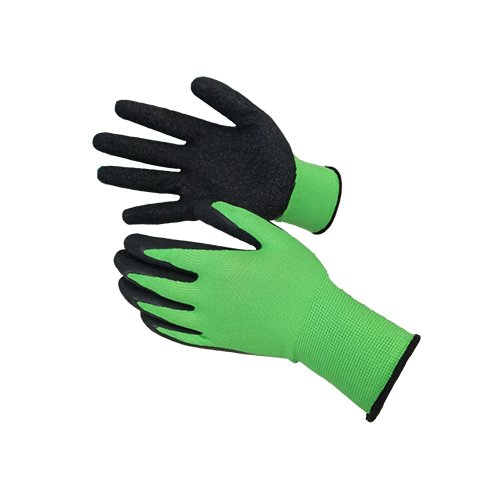
Synthetic Gloves
· Pros
- These gloves feature lightweight
- Synthetic gloves offer outstanding durability as well as higher softness
- These gloves resist water with a great flexibility
- You are not going to experience any allergy on your skin because these gloves do not contain Latex
- By using synthetic gloves, you can get high puncture resistance and zero impact of the chemical on your gloves
· Cons
- Does not cater to high comfortability needs
- Offer you a low level of elasticity in comparison to the natural rubber gloves
· Usage
- Construction industry
- Plumbing
- Material Handling
6. Neoprene
Neoprene belongs to a class of synthetic rubbers that results in due to polymerization of chloroprene. Another name for neoprene is polychloroprene.
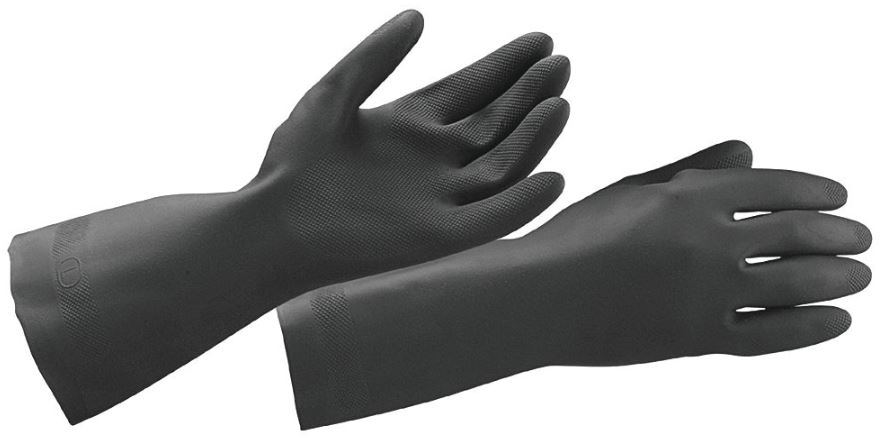
· Pros
- You can enjoy very high oil resistance when using neoprene gloves
- Have the ability to overcome the severe impact of higher temperatures
- A higher cold does not stop you from using neoprene gloves. This is because it resists cold.
- Does not deteriorates by the ozone as well as oxidation agents. This means it resists weathering
- The neoprene gloves feature high chemical inertness. Greases, alkalis, and acids alter the chemical composition of neoprene gloves.
- These gloves are waterproof and ensure a perfect fit
- You can experience zero skin allergies because they contain no natural ingredient
· Cons
- Low abrasion resistance
- Prone towards the cuts or punctures
- The cost or price associated with these gloves is very high
- Have a solid ability to conduct electricity
- Cannot resist the impact of more potent acids
· Usage
A number of industries can facilitate the use of neoprene gloves. The key ones are:
- Laboratories
- Medical field
- Automotive repair and maintenance
- Food industries
- Mining
- Safety and Construction
7. PVC
You can manufacture PVC gloves using polyvinylchloride, a synthetic plastic material. After polypropylene and polyethylene, it lies among the third most widely used plastic material.

· Pros
- These gloves are highly flexible, and you can efficiently work with anti-static applications while using them
- The price of these gloves is not very high, and you can get these gloves at lower rates in comparison to other gloves
- These gloves can better resist wearing and tearing
- You cannot get any skin allergy when using PVC gloves
· Cons
- Non-biodegradable
- Low puncture resistance
- Possess adverse impact on the environment
·Usage
- Beauticians can use these gloves while dealing with cosmetic products
- In the food industry, where employees dealing with various food products
- Automotive manufacturing vicinity
- Janitorial industry
8. Acrylic
Acrylic gloves also refer to gloves having synthetic material. You can refer to acrylic as fabric, plastic, or fiber. Acrylic manufacturing takes place in a factory by using artificial materials.

· Pros
- It is a great choice when it comes to thermal insulation
- You can experience higher weather resistance when using acrylic gloves
- Acrylic gloves are very lightweight and are genuinely comfortable to hand
- You can wash it to maintain the look and feel
- Feature water repellency
· Cons
- Meager abrasion resistance
- It does not hold up when it comes to higher temperatures
· Usage
There are different fields exist where you can find acrylic gloves. Some notable areas are:
- Hospitals
- Food Factory
- Laboratory
- Precision manufacturing/ assembly
9. Polyurethane
Polyurethane is a plastic material that utilizes polymers containing organic units/links, often known as carbamate. This material features wide adaptation in glove manufacturing.
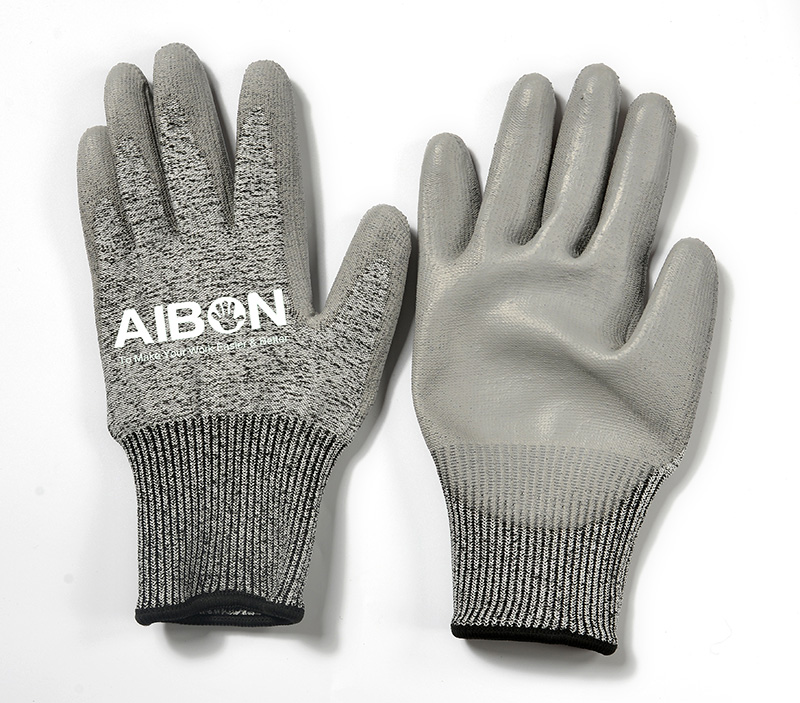
· Pros
- Features superb dexterity as well as better grip
- Offer better ease in handling as well as movements
- Ensures high breathability as well as Eliminate sweating
- Super abrasion resistance, which leads to longevity of the polyurethane gloves
- Very thin and can quickly act as your second skin
· Cons
- Not suitable for oily, wet as well as greasy environments
- This can result in skin sensitivity issues
· Usage
Multiple application exists for polyurethane gloves:
- Best for small components handling
- Metal Handling
- Aeronautics
- Electronics
10. Cotton
Cotton gloves refer to knitted gloves that use cotton, a completely natural fiber in their manufacturing. These gloves feature an elastic band for a tighter grip. A perfect fit for low to mild protection.
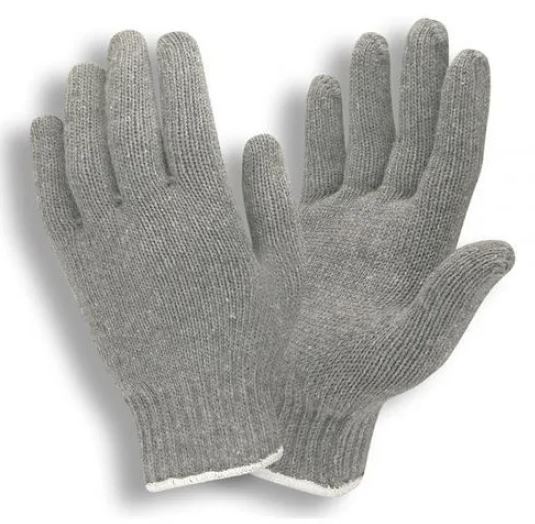
· Pros
- Very comfortable and convenient for the hands
- Help you protect from hand sweating
- Possess no adverse impact on the environment and features a complete hygiene
- Resist the heat as well as cold moderately
- It can increase your efficiency of working drastically
- Keep hands clean in a dirty and dusty environment
· Cons
- Does not resist water
- People suffering from eczema cannot wear cotton gloves
· Usage
- Light automotive working
- Landscaping
- Warehouse
- General maintenance
- Hotel Chefs
- As a Fashion accessory
11. Glass Fiber
Fiberglass is a kind of plastic that features glass fiber in reinforced form.
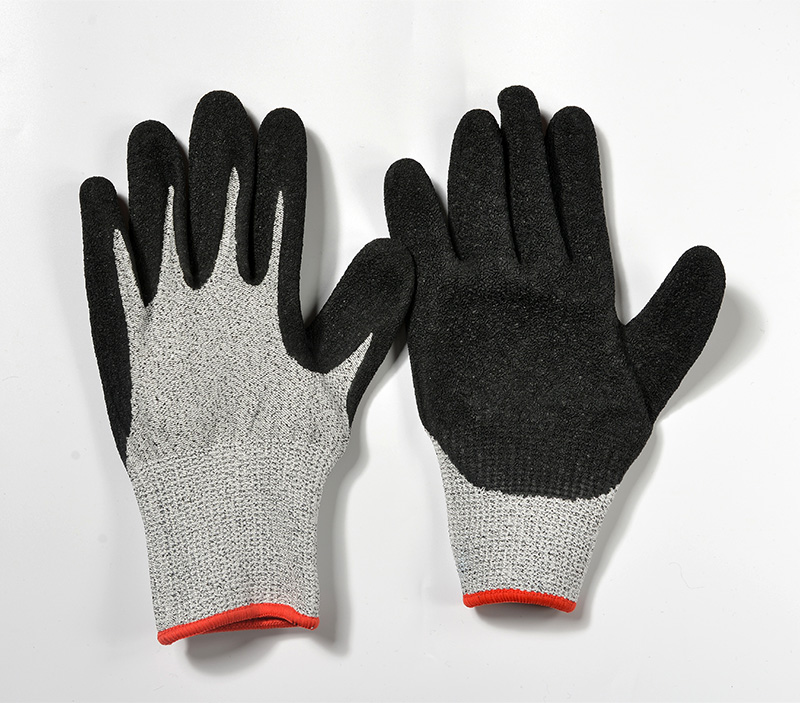
· Pros
- Fiberglass gloves are highly heat-resistant gloves
- Resist chemicals with an impact that is 3x more than that of PVC or Latex
- Offer you remarkable grip while working
- You can work mechanically wearing fiberglass gloves
- Features higher electrical insulation or protection
· Cons
- This can lead you to face severe skin problems and issues
- The cost of these gloves is relatively high in comparison to other gloves
· Usage
- Welding
- Kilns
- Paint application
- Glass handling
- Electronic repair and maintenance
12. Polyester
Polyester often refers to the synthetic material that features ester links throughout its composition. You can draw it from petroleum. An option exists to manufacture gloves using polyester fabric.
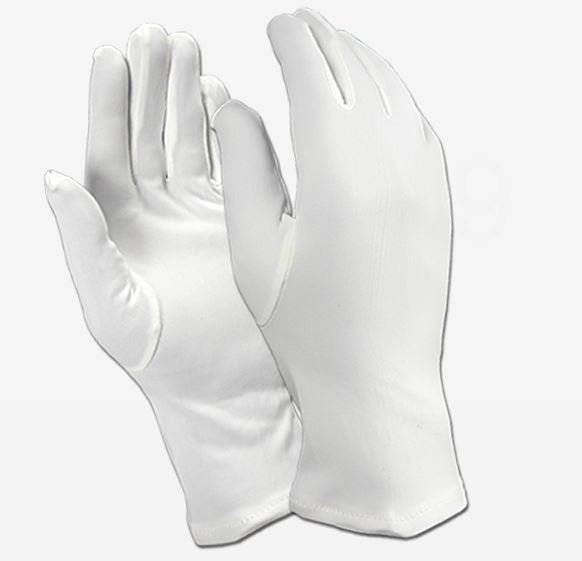
· Pros
- Highly flexible and properly ensure a viable degree of warmth
- Does not shrink over time
- Super comfortable and convenient against your skin
- Polyester gloves are lightweight gloves and are washable
- You can experience a zero-chemical impact over your gloves as well as
- These gloves resist the penetration of UV rays
· Cons
- It can lead you to face irritation when wearing it for long due to sweat
- Low breathability
- It can often result in odors when worn for longer
· Usage
You can use polyester gloves in the following industries.
- Marine Industry
- Packaging Industry
- Automobile Industry
- Construction Industry
- Engineering Industry
- Rubber Industry
- Glass Industry
13. Spandex
Another synthetic class of fabric which mainly known for its exceptional level of elasticity. It results due to the polymerization of polyether as well as polyurea. Spandex gloves are primarily famous because of the level of elasticity they offer.
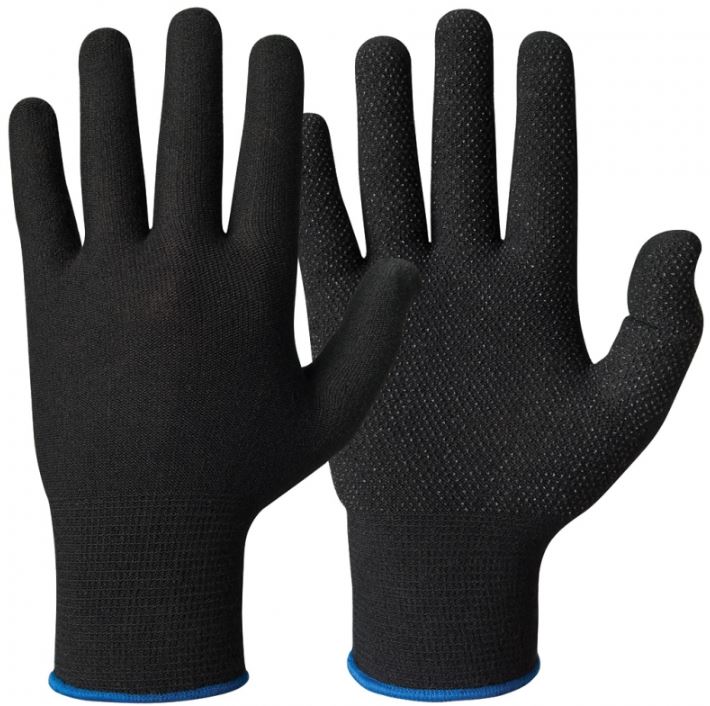
· Pros
- With time the spandex gloves are not going to lose their shape as well as elasticity
- Super comfortable and convenient
- Offers high resistance to acids as well as alkalis
- You can dye it into any color you want, and it does not fade quickly
- You are going to experience prolonged aging when it comes to spandex
· Cons
- Spandex gloves trap moisture as well as sweat when you are wearing it
- Not suitable for those who have skin allergies due to spandex
· Usage
- Driving
- Racing
- Motorcycle usage
- Grease or Oil applications
14. HDPE
HDPE refers to high-density polyethylene, a resin that forms due to ethylene polymerization.
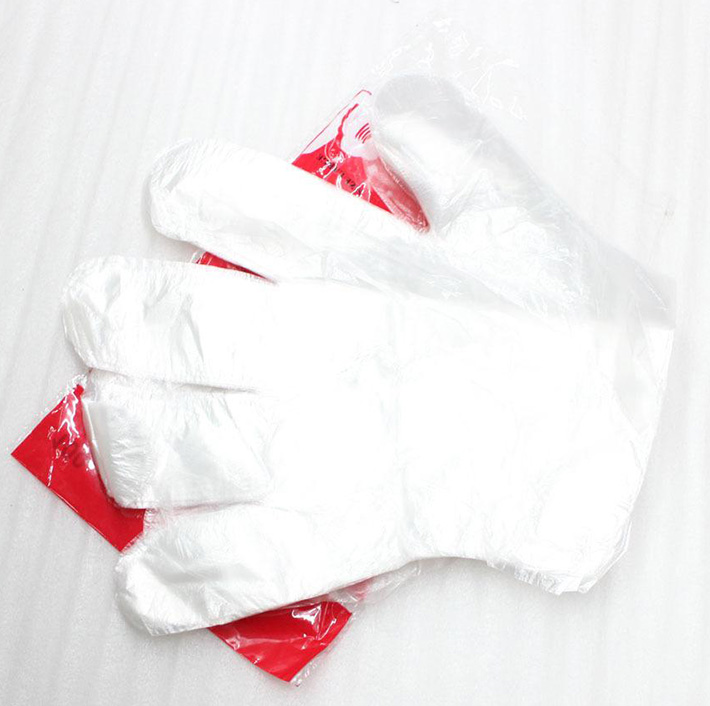
· Pros
- HDPE gloves offer zero level of toxicity
- It is completely odorless and has no reactions on the skin
- Ensure and provide complete hygiene
- Very cheap and super convenient for usage
· Cons
- These gloves have lower strength
- The HDPE material is flammable
- It does not offer effective weather resistance
- You can experience expansion when subjected to the high temperatures
· Usage
- Food Handling
- Cleaning and household
- Gardening
- Painting
- General usage
Factors That Affect The Choice of Right Gloves Material
A number of things play their part when selecting the suitable material for gloves. Find below the key things which need your attention in this regard.
1. Tensile Strength
Check the tensile strength of the glove material before purchasing it. The tensile strength plays a significant role in assuring zero cracks. It determines the force you need to apply until a specific material breaks. This feature ultimately contributes to the effectual working against sharp or pointed objects.
Greater tensile strength ensures you can work longer with particular pair of gloves. For instance, Latex gloves feature a tensile strength of 10 up to 20 MPa, while the Nitrile has a tensile strength of up to 20 MPa up to 50MPa.
2. Durability
Another aspect that needs your attention is durability. This determines how strong the material is to bear the shocks and impacts during work. For example, a latex glove is more durable than a vinyl glove.
While on the other hand, Nitrile and Neoprene offer higher durability similar to that of latex gloves. When performing critical and sensitive tasks, higher durability plays a part. End applications also decide the level of durability you need.
3. Comfort
You cannot deny the comfort level you can get from the gloves. If the glove irritates you, you cannot pay attention to your work correctly. This can also lead you to faults and wrongs in your tasks. Make sure it offers super convenience and comfort. After wearing, you must get a feel of wearing nothing. This is what ensures higher efficiency and performance.
4. Biodegradability
The biodegradability means your glove is environmentally friendly. Consider this fact while choosing a glove. This type of glove does not possess any hazardous impact on the environment. Biodegradability means microorganisms can consume the glove material and make it disappear in the background. This also ensures zero level of pollution to the environment.
5. Affordability
This is the first thing that people consider while choosing their gloves. Make sure that the glove you are going to choose is entirely affordable. You need to ensure it lies within your budget. Several options and alternatives exist that cater to your needs in this regard.
6. Chemical Resistance
The resistance to chemicals means how effectively a glove can overcome the severe reaction of chemicals. Those gloves that do not offer chemical resistance can face severe deterioration, color fading, material degradation, etc. Apart from that, the gloves that feature incredible chemical resistance prevent you from extra heat/burns, abrasion, harmful substances, etc.
7. Food Safety
The food safety of a particular glove does matter. This is because specific gloves release contaminants. The gloves also play their role as a barrier for direct contact between the skin and the food. This ensures hygiene and keeps food safe while catering to effective handling.
8. Abrasion Resistance
Abrasion refers to the chipping or wearing away of the surface material. This factor is crucial as it greatly influences the life of the glove material. Bu using the synthetic glove fabric layers that offer abrasion resistance, you can ensure comfort, convenience, high performance, and protection.
Conclusion
After reading the detailed article on gloves material. Now you can know which gloves to choose for which type of application. If you find the above article informative, please share it with others.
In case you have any suggestions about the above information or need any assistance. You can get to us anytime you want. Choose the means of a comment section or email to reach out to us. We will leave no stone unturned in doing so.
More Resources:
Common Materials for Gloves – Source: Badger Australia
Glove Materials – Source: Guide Gloves
Glove Selection Guide – Source: EHS
Glove Selection Chart –Source: FSU
Chart for Selecting Gloves – Source: Augusta
Choosing Right Protective Gloves – Source: Direct Industry
Materials for Gloves – Source: Cestusline


